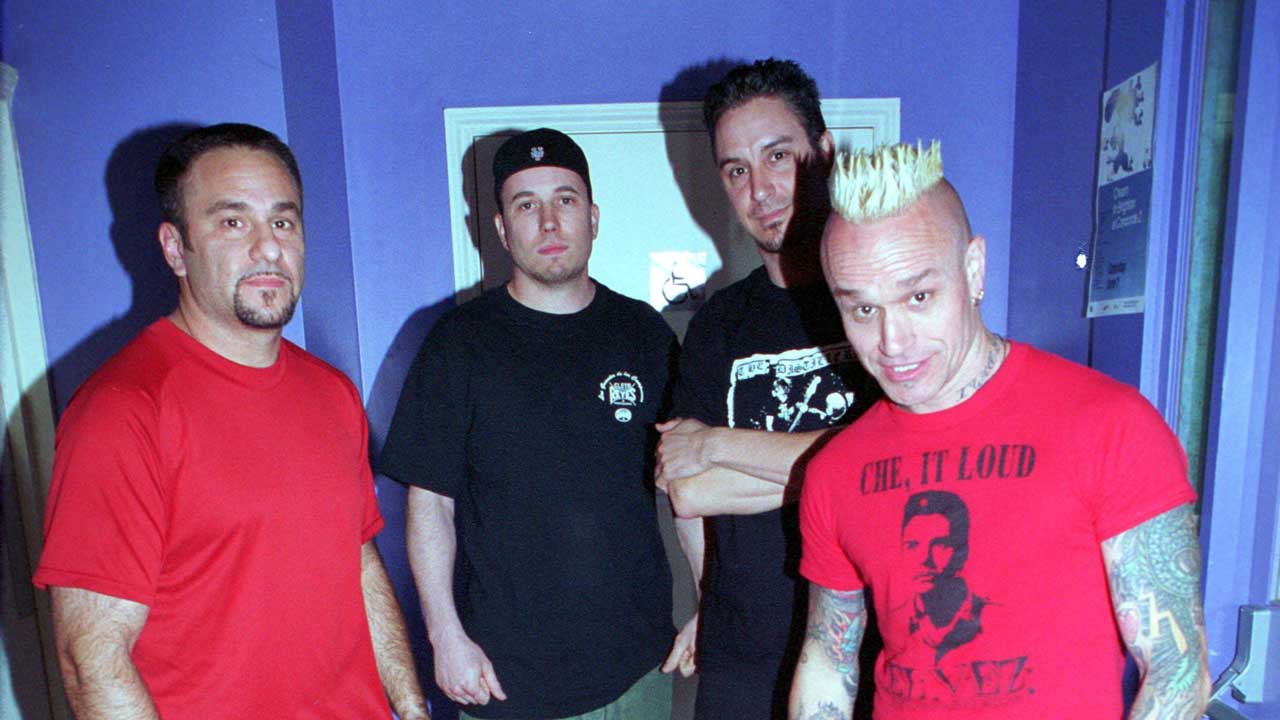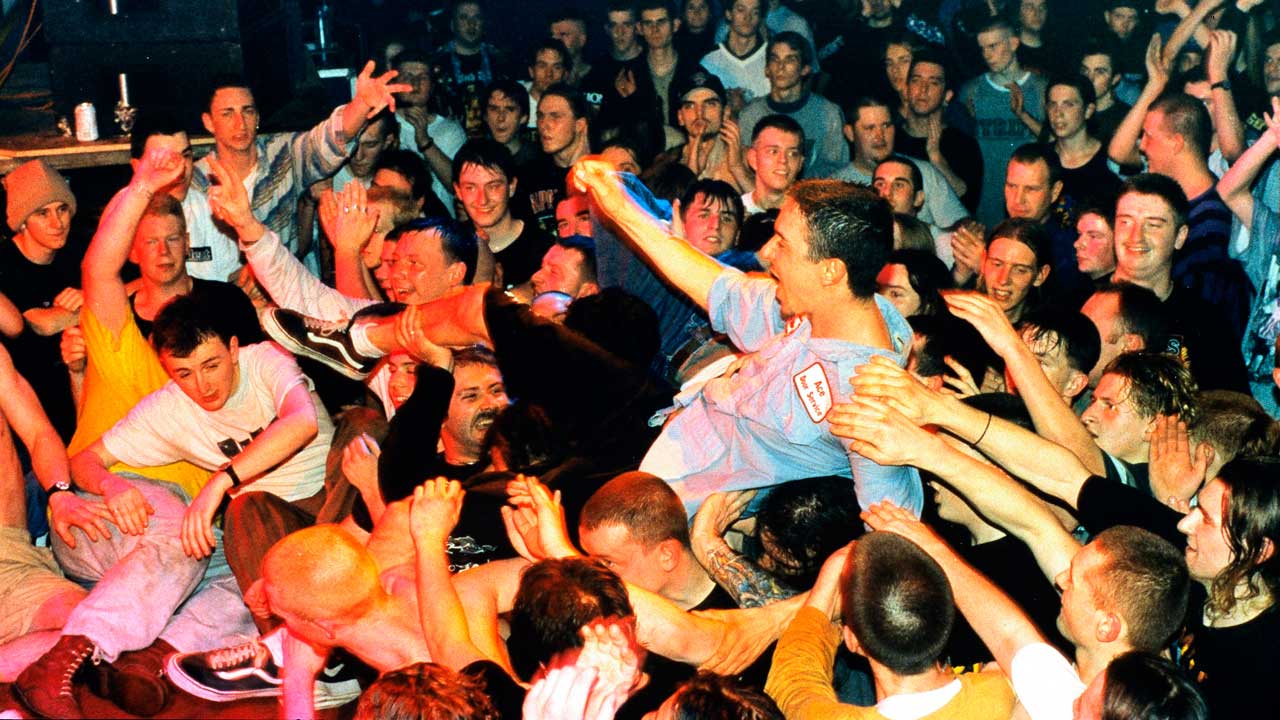Go to any rock or metal festival in the world right now and you’ll almost certainly see some type of hardcore band onstage. It’s a far cry from the early 90s; while grunge, thrash and skate punk all had their moment in the mainstream sun, hardcore remained a resolutely underground movement. Then, from out of nowhere, New York’s Sick Of It All were signed to major label East West and proceeded to give hardcore its first break toward mainstream acceptance.
“It was a funny one, actually,” says frontman Lou Koller today. “I wouldn’t say that us signing to a major caused too much hassle towards us from the scene, but there was this feeling that everyone thought we were going to make an album that sounded like Green Day. So, the result was that we made an album that was even heavier than anything we had ever done before, just to show them!”
The record in question was their now-classic third album, Scratch The Surface. Released on October 18, 1994, it immediately became apparent that Sick Of It All had made an album that, thanks to songs like the furious Goatless and brutal Maladjusted, made a mockery of the idea that moving hardcore to a major label was the sign of a band selling out. But, if hardcore was going to crack the mainstream, it was going to need an anthem to pull people in.
“We would get in the rehearsal room and just jam some stuff out before we practised,” Lou tells us about the genesis of what would become their most famous song. “We’re all really big fans of Oi and early UK punk. You know, UK Subs, that kind of thing. We just started jamming this song out one day as a fun thing, so it came together easily. Next thing we know, it’s on the album and the label are saying to us ‘That’s it! That’s the single! That’s the one we want the video for!’ We were like, ‘Really?’ because it seemed like such a funny little fool-around song to us.”

This “Funny little fool-around song” was soon to become a milestone in the world of hardcore, and arguably NYHC’s first crossover anthem. Built around a huge gang vocal, Craig Ahead’s iconic bassline and Lou’s impassioned lyrics about the importance of staying true to your underground roots, Step Down was the perfect song at the perfect moment to introduce the world to the glory of hardcore. But, as great as it sounded, hardcore is a world that you have to see to fully appreciate. And that’s where the video for the song joins the story.
“We thought it was kinda odd making a video, of course,” shrugs Lou. “But we thought that if we were going to do it and it was going to be seen by a lot of people, then it should really try and capture the essence of us and show them what hardcore is. We might be this super-tough band who play this really intense music, but we like to have fun and laugh. We were kind of poking fun at the scene with a lot of affection, because it had got so serious and so many bands just weren’t allowed to crack a smile. So were wanted to show the world hardcore, but also let them know that we could have fun, too. We had a guy at East West who was in charge of all these R&B acts and he came to see us just to support the label, and he came up to us afterwards and said that he’d never had so much fun at a show as he did when he saw us!”
The video for Step Down is still brilliantly hilarious today. With a roving reporter “exposing” the murky world of hardcore (ironically, it would indeed have been many people’s actual first exposure to hardcore), the clip sees him entering a dingy club with SOIA tearing up the stage. But the most enjoyable aspect was the parodying of the many different styles of hardcore dancing that could be seen at club shows around the world – a brilliantly knowing and genius piece of satire on the scene from which Sick Of It All came.
“We could go down to the shows around New York and just people watch,” says Lou about where the idea came from. “And we would kind of point out the different dances that people were doing and make each other laugh by giving them different names. You know, ‘Oh, he’s picking up change.’ ‘Look at that guy making a pizza!’ We just decided to stick them in the video.”
There’s even a sneaky dig at one of punk rock’s most successful 90s bands buried within the clip. “We had a little private joke at Rancid’s expense,” Lou laughs. “There’s some guys doing the ‘Classic New York Style’ and then the next guys are doing the ‘Californian Version Of The Classic New York Style’ and getting it all wrong. Then, right at the end, one of them falls over. We were on tour with Rancid and we played them at bowling, and [Rancid bassist] Matt Freeman came to bowl and fell flat on his ass! We’ve never let him forget that… or the fact that we beat them at bowling. So that’s why that’s in the video.”

Step Down then managed the previously unimaginable feat of being picked up by MTV, and suddenly a whole new world of people were having hardcore beamed into their living rooms. The effect it had on Sick Of It All was to turn them into trailblazers for a type of music that had never made so much as a dent outside of its own walls.“I think a lot of it was to do with the timing being right,” considers Lou. “In the 80s it seemed like Murphy’s Law were going to go over the top and it just never really happened. Ten years later we got the push and it did happen. It was just being in the right place at the right time.”
With the band sent out to tour the album, they were now being taken away from hallmark clubs like CBGB’s and placed in front of a very alien crowd. Needless to say, what with Sick Of It All being one of the greatest live bands of any era, they smashed it.
“We did tour with a lot of metal bands,” nods Lou. “We actually took Korn out on one of their first ever tours, we opened for Sepultura, we did Reading festival a couple of times. We’d always have people looking at us like, ‘What?’ to begin with and then, whether they liked it or not, you could see they appreciated the energy of this type of music.”
Such was the impact of Step Down and the whole of the Scratch The Surface touring cycle that SIOA found themselves placed on a pedestal they weren’t strictly comfortable with. “This was when people started to say that we were ‘The godfathers of hardcore’ and all that shit,” Lou laughs. “We would always set them straight and say that we aren’t the godfathers of hardcore, but we are happy to be the ambassadors of hardcore. I think we were the right band to do it, because we never believed, like some of the bands in our scene did, that this music should be hidden away from people. We wanted to go out and expose it to as many people from outside of our walls as we could. We really saw nothing wrong with that.”
- Bring Me The Horizon’s Oli Sykes: I love how much Amo is polarising opinions
- The tragedy and darkness behind Parkway Drive’s Reverence album
- How Seventh Son Of A Seventh Son lifted Iron Maiden to heavy metal immortality
- 14-year-old takes on Dream Theater's In The Name Of God... all by himself
The effect, nearly 25 years later, is that Step Down is an integral part of any Sick Of It All show: “I still love playing it,” smiles Lou. ”It’s just a fun song to play and it gets a hell of a response. We’re never going to drop it, that’s for sure.”
It’s also seen them become the band that are rightly lauded as the very first to bring hardcore crashing through the door to wider acceptance in the rock and metal scene. And even inspire people in some thoroughly unexpected places.
“We get bands telling us that we were their inspiration now and again,” Lou very modestly claims. “I don’t always hear it. The guy from Dashboard Confessional came up to me at a festival once and he said ‘Sick Of It All were the single most important band of my life when I was growing up’ which was very nice, but I just thought, ‘Really? I don’t hear it!’ Then the singer from Disturbed saw
me and he said that we were the number one inspiration for him as well! That’s a pretty big swing: Dashboard Confessional to Disturbed. I don’t know what either of them got, but I’m glad they got something.”
Concrete proof that with Step Down Sick Of It All really did take hardcore to a whole new level, and we’re still reaping the benefits of their groundwork to this very day. All hail the godfathers... sorry, the ambassadors of hardcore.
Originally published in Metal Hammer issue 317

